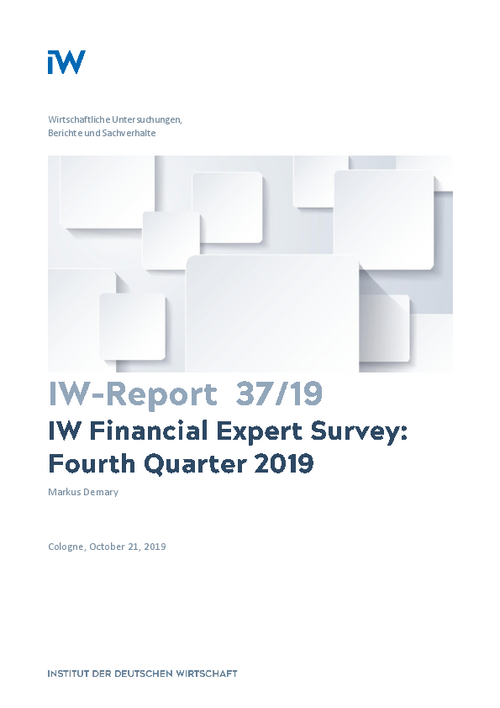Pessimism determines the experts’ predictions for the last quarter of 2019 and first quarter of 2020, which can be inferred from the downward revisions of the experts’ forecasts. More downward revisions than upward revisions indicate that the experts have interpreted the incoming information between end of June 2018 and end of September 2019 mostly as bad news.

IW Financial Expert Survey: Fourth Quarter 2019
IW-Report

Pessimism determines the experts’ predictions for the last quarter of 2019 and first quarter of 2020, which can be inferred from the downward revisions of the experts’ forecasts. More downward revisions than upward revisions indicate that the experts have interpreted the incoming information between end of June 2018 and end of September 2019 mostly as bad news.
Part or the forecast revisions for the interest rates is due to the experts' subdued inflation and growth outlooks. All experts have revised their growth outlooks for Germany and the Euro Area downwards. So were inflation forecasts for Germany revised downwards by 8 experts, while inflation outlooks for the Euro Area were revised upwards by 7 experts. The other part of the interest rate forecast revisions were due to revisions about the future path of monetary policy interest rates, which also reflect a subdued inflation and growth outlook. While no experts expect the ECB to change its monetary policy, 12 experts have revised their forecasts for the federal funds rate downwards.
The experts still expect the yield curve to become flatter. The lower forecasts for the short-term interest rate are consistent with the experts’ lower inflation and growth expectations. For 2020, the experts expect 1.3 percent inflation in the Eurozone and a growth rate of real gross domestic product of 1.0 percent, which indicates a slowdown of economic growth and a failure of the European Central Bank (ECB) to meet its inflation target. Given that, the experts lowered their outlook for the long-term interest rate to -0.49 percent at the end of the first quarter of 2020. For the short rate, the experts predict a downward change to -0.57 percent during the first quarter of 2020. In line with that, the experts expect the yield of US Treasury bonds to increase slightly from 1.66 percent to 1.69 percent by the end of the first quarter of 2020, although they expect the Federal Funds Rate to decline from 1.75 – 2.00 percent to 1.40 to 1.66 percent averaged over their individual forecasts. Despite the accommodative monetary policy stance of the ECB in 2019, the experts predict an appreciation of the Euro from 1.090 US-Dollar to 1.131 US-Dollar during the first quarter of 2020.
Although some of the experts revised their stock market forecasts downwards, they expect the DAX to decrease slightly by -0.1 percent and the Stoxx index and the S&P 500 to increase by 1.3 percent and 2.3 percent by the end of the first quarter of 2020.
In the long-term ranking, which covers the last 18 quarters, National-Bank defended rank one, while Nord/LB moved from rank three to rank two and Commerzbank moved from rank two to rank three.

Markus Demary: IW Financial Expert Survey – Fourth Quarter 2019
IW-Report


33. Finanzmarkt Round-Table: De-Industrialisierung – Gefahr für den Finanz- und Wirtschaftsstandort Deutschland?
Das Institut der deutschen Wirtschaft, die DekaBank und die Börsen-Zeitung laden Sie zum Finanzmarkt Round-Table am Montag, den 29. April 2024 von 10:30 bis 12:30 Uhr ein. Der Round-Table findet als Online-Veranstaltung statt.
IW
Deindustrialisierung: Aktuelle Entwicklungen von Direktinvestitionen
Obwohl sich die Situation bei den Energiekosten nach den Turbulenzen der letzten Jahre wieder etwas entspannt hat, sehen wir weiterhin hohe (Netto-)Abflüsse von Direktinvestitionen aus Deutschland. Das deutet darauf hin, dass die Perspektiven am Standort ...
IW